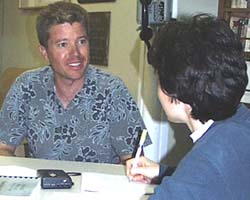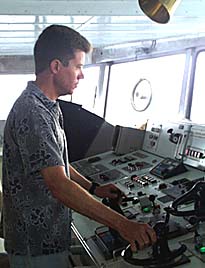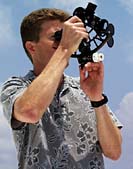|
|
Interviews: Captain Eric Buck
Question:
What are your main responsibilities on board during this cruise? Captain Buck: My main responsibilities on this and other cruises are to operate the ship and manage the crew in such a way that we have the maximum possibility of achieving the scientific goals, as well as monitoring compliance with all the legal requirements for operating a ship. I have overall responsibility for the safety of everyone on board, general oversight of the day-to-day operations and making sure that all my people do what they have to do to help out the science party. Question: What do you do on a typical working day at sea? Captain Buck: A typical day starts early in the morning, spending a couple of hours on the bridge, checking on the navigation, whether we are on schedule and what the plan of the day is. I consult with the chief engineer, the chief mate and the chief scientist to see what the particular needs of the day will be and to make plans accordingly. We schedule the crew to help out the science party where needed and coordinate the work in progress. The daily routine also includes planning for the next port call, communicating with the office on shore, working on logistics, writing reports from the last trip, looking ahead to repair work that might be necessary for the ship in the future, and working with the cook to figure out the grocery list for the next port. There is a lot of behind-the-scenes work that is not very obvious that has to be done for the long-range, smooth operation of the ship. I also stand a navigation watch (0400 to 0800 hours) on the bridge--by choice, because I enjoy it. If I'm not careful the captain’s job can turn into a desk job, and standing a watch gets me out practicing the trade. The other thing I have found is that equipment on ships has become very technically sophisticated over the years, with computers controlling everything from navigation to engines to data collection. If I don't stand a watch I don't keep up on all the technical things. Question: How did you end up working at Scripps Institution of Oceanography? Captain Buck: When I graduated from maritime school I had no prospects and was looking for work with other employers. While I was looking, I heard of a temporary job that was available at Scripps. The Melville had just returned from a long voyage, and was going into a shipyard, and all the regular crew had gone on vacation. I signed on as an able-bodied seaman and basically scraped paint and cleaned the lifeboat bilges. One thing led to another, and here I am today as a captain. I have also worked on other Scripps ships such as the RV Thomas Washington, the RV New Horizon and a few trips on the RV Sproul.
What do you like the most about your job or being at sea? Captain Buck: The thing I like most about my job is the opportunity for travel and adventure in remote and exotic places. I think that is the absolute highlight of going to sea. My favorite places are probably the South Pacific islands and Australia, and particularly Tasmania. I also really enjoy the tranquility you can get at sea when the weather cooperates, and not having to commute and spend several hours a day driving in traffic! Question: What do you like least about your job or being at sea? Captain Buck: The thing I like the least about it is the long separation from my family. Before I was married, it was the greatest job in the world with all the travelling, but it gets really tough when you have a family.
|
||||||
|
|
|||||||
© 2010 Dive and Discover™. Dive and Discover™ is a registered trademark of
Woods
Hole Oceanographic Institution



